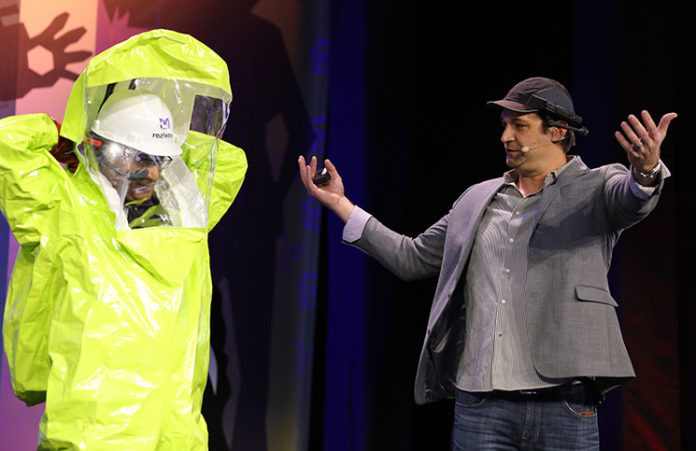
When RealWear CEO Andy Lowery talks about his decision to move the company’s headquarters to the Artillery Barracks at the Fort Vancouver National Site in 2017, he said the “delivery has outweighed the expectations.”
“We have absolutely found our home, the right culture here in Vancouver for RealWear,” Lowery said. “History is something we’re proud of, and we believe really strongly in tradition, respecting the people who came before us, respecting the tradition of a beautiful monument like Fort Vancouver. I fell in love coming here, I’m still in love with it. We’re here to stay.”
Since moving its headquarters to the Vancouver area last year, RealWear, a global leader in augmented reality (AR) hardware technology for industry, has continued to grow and expand its reach substantially. The company started with the launch of its HMT-1 product – a voice-driven, hands-free, head-mounted tablet. The wearable tablet is designed for skilled technicians and engineers in field service, equipment inspection, maintenance and complex manufacturing assembly. However, Lowery said the device has started to gain popularity within different industries that he never expected.
“One of my founders, through a previous company he had, had a lot of friends who were professional athletes,” Lowery said. “I met a couple of ex-NBA players who were doing ambassador to China basketball camps where they were teaching kids basketball, teaching them on the spot. The problem was that it wasn’t very consistent, so they ended up taking the HMT-1 device and giving it to the kids there. Other retired NBA players could then opt into a program and help teach these kids, remotely, how to play basketball.”
“Not only does this enable the players to teach the kids remotely, they can also help teach the amateur coaches in China all the way from their living room in LA, or wherever they are,” Lowery continued. “This is something I didn’t expect at all, this crossover into sports.”
Other industries that have started using RealWear’s device include the medical industry, automotive industry, utility field workers and more. Lowery said that people who work in the utility fields that include oil, gas and mining benefit greatly from using RealWear’s explosive-proof device, the HMT-1Z1.
“With this product, we’re looking at things like servicing oil platforms in the ocean, things like that,” Lowery said. “With the base system, this includes things like going to work on power poles, distribution lines, etc.”
The automotive industry is another area that Lowery said they have seen an increased demand for the HMT-1 device. Recently, Volkswagen Commercial Vans group signed a deal with RealWear to deploy the devices at all of their service centers using remote mentor (real-time video sharing – see what I see). Other uses of the device in the automotive industry include Toyota Lexus and Volvo Trucks.
“The compelling event with the auto companies (that made the device popular) is really that the companies are building all of these new, technology-leveraging cars, and the service centers are saying that they’re good with all of the standard cars, but they don’t know how to troubleshoot the new ones or work on them,” Lowery said. “The companies are saying, ‘Hey, we need to be able to deliver these HMT-1s to our service centers, the experts need to be able to watch and train workers at the service centers in situ.’ So, someone from Germany or wherever can dial in and help this guy in Washington or California, wherever it may be.”
Another big step for RealWear this year was the announcement that Honeywell signed a strategic agreement with the company. Honeywell is a Fortune-100 software-industrial company that delivers industry specific solutions that include aerospace and automotive products and services; control technologies for buildings, homes, and industry; and performance materials globally.
“Honeywell, taking our system to market and branding it as a RealWear computer, has taken us from prototype to tens of thousands with Honeywell,” Lowery said. “We’re talking about hundreds of thousands being used in medical, transportation, linguistics, retail, food and beverage, telecom, gas and oil and more.”
The continued success that RealWear has seen this year has continued to help the company grow.
“We’ve hit every one of our numbers so far,” Lowery said. “We started out in September last year with eight people, now we have about 40 a year later, and we expect to double again next year. RealWear is a stepping stone toward this ambiguous knowledge transfer. Our mission is this harmony between machine and man. We don’t call it cyborgs, we call it centaurs, because a centaur is a mythical, organic creature that contains the strength and speed within the horse, but the man still has the smarts, the thinking ability.”
“It is incredibly rewarding to see Clark County-based companies succeed on a national and global scale,” said Max Ault, interim president at the Columbia River Economic Development Council (CREDC). “RealWear has been a great addition to our region’s business community and it is yet another example that Clark County is a compelling choice for software and technology companies who value access to a talented workforce and a high quality of life. As we continue to keep a pulse on the future of work, it is energizing to see revolutionary companies like RealWear thrive in Clark County. CREDC will continue to work closely with public and private partners to expand the footprint of this sector in our region.”
Lowery will be speaking at the Vancouver Business Journal’s Boardroom Breakfast event on Wednesday, Sept. 5, from 7:30-9 a.m., at the Red Cross Building at the Fort Vancouver Site, 605 Barnes St., Vancouver. Tickets can be purchased at https://www.vbjusa.com/boardroom-breakfast-series/.






